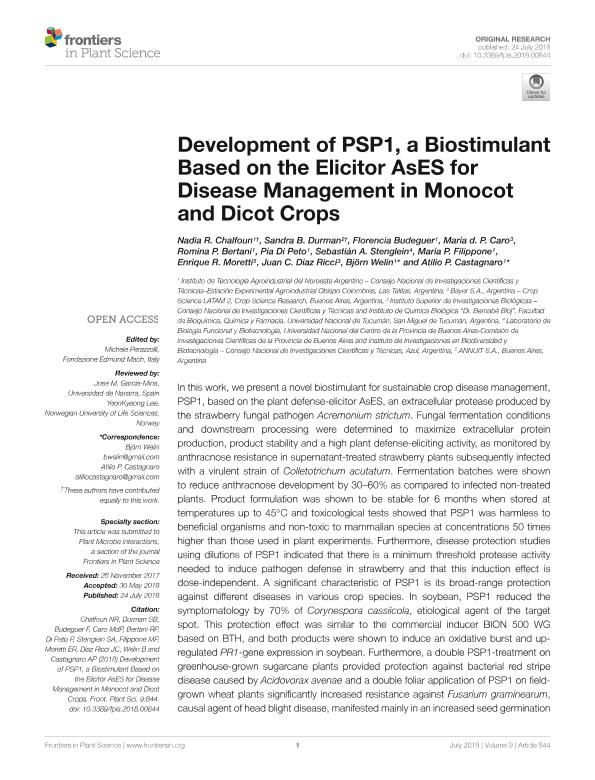Artículo
Development of PSP1: A Biostimulant Based on the Elicitor AsES for Disease Management in Monocot and Dicot Crops
Chalfoun, Nadia Regina ; Durman, Sandra B.; Budeguer, Florencia
; Durman, Sandra B.; Budeguer, Florencia ; Caro, María del Pilar
; Caro, María del Pilar ; Bertani, Romina Priscila
; Bertani, Romina Priscila ; Di Peto, Pía de Los Ángeles
; Di Peto, Pía de Los Ángeles ; Stenglein, Sebastian Alberto
; Stenglein, Sebastian Alberto ; Filippone, María Paula
; Filippone, María Paula ; Enrique R. Moretti; Diaz Ricci, Juan Carlos
; Enrique R. Moretti; Diaz Ricci, Juan Carlos ; Welin, Bjorn
; Welin, Bjorn ; Castagnaro, Atilio Pedro
; Castagnaro, Atilio Pedro
 ; Durman, Sandra B.; Budeguer, Florencia
; Durman, Sandra B.; Budeguer, Florencia ; Caro, María del Pilar
; Caro, María del Pilar ; Bertani, Romina Priscila
; Bertani, Romina Priscila ; Di Peto, Pía de Los Ángeles
; Di Peto, Pía de Los Ángeles ; Stenglein, Sebastian Alberto
; Stenglein, Sebastian Alberto ; Filippone, María Paula
; Filippone, María Paula ; Enrique R. Moretti; Diaz Ricci, Juan Carlos
; Enrique R. Moretti; Diaz Ricci, Juan Carlos ; Welin, Bjorn
; Welin, Bjorn ; Castagnaro, Atilio Pedro
; Castagnaro, Atilio Pedro
Fecha de publicación:
24/07/2018
Editorial:
Frontiers Media SA
Revista:
Frontiers in Plant Science
ISSN:
1664-462X
Idioma:
Inglés
Tipo de recurso:
Artículo publicado
Clasificación temática:
Resumen
In this work we present a novel biostimulant for sustainable crop disease management named PSP1. PSP1 is based on the plant defense-elicitor AsES, an extracellular protease produced by the strawberry fungal pathogen Acremonium strictum. Fungal fermentation conditions and downstream processing were determined to maximize extracellular protein production, product stability and a high plant defense-eliciting activity, as monitored by anthracnose resistance in supernatant-treated strawberry plants subsequently infected with a viral strain of Colletotrichum acutatum. Fermentation batches were shown to reduce anthracnose development by 30 to 60% as compared to infected non-treated plants. Product formulation was shown to be stable for 6 months when stored at temperatures up to 45°C and toxicological tests showed that PSP1 was harmless to beneficial organisms and non-toxic to mammalian species at concentrations 50 times higher than those used in plant experiments. Furthermore, disease protection studies using dilutions of PSP1 indicated that there is a minimum threshold protease activity needed to induce pathogen defense in strawberry and that this induction effect is dose-independent. A significant characteristic of PSP1 is its broad-range protection against different diseases in various crop species. In soybean, PSP1 reduced the symptomatology by 70% of Corynespora cassiicola, etiological agent of the target spot. This protection effect was similar to the commercial inducer BION 500 WG based on BTH, and both products were shown to induce an oxidative burst and up-regulated PR1-gene expression in soybean. Furthermore, a double PSP1-treatment on greenhouse-grown sugarcane plants provided protection against bacterial red stripe disease caused by Acidovorax avenae and a double foliar application of PSP1 on field-grown wheat plants significantly increased resistance against Fusarium graminearum, causal agent of head blight disease, manifested mainly in an increased seed germination rate. In summary, these disease protection studies demonstrated an effective control against both bacterial and fungal pathogens in both monocot and dicot crop species, which together with its low production cost, effectiveness at low concentrations, long shelf-life, tolerance to high temperatures, harmlessness to non-target organisms and simple handling and application, make PSP1 a very promising candidate for effective and sustainable disease management in many crop species.
Archivos asociados
Licencia
Identificadores
Colecciones
Articulos(INSIBIO)
Articulos de INST.SUP.DE INVEST.BIOLOGICAS
Articulos de INST.SUP.DE INVEST.BIOLOGICAS
Articulos(ITA-NOA)
Articulos de INST. DE TECNOLOG. AGROINDUST. DEL NOROESTE ARGENTINO
Articulos de INST. DE TECNOLOG. AGROINDUST. DEL NOROESTE ARGENTINO
Citación
Chalfoun, Nadia Regina; Durman, Sandra B.; Budeguer, Florencia; Caro, María del Pilar; Bertani, Romina Priscila; et al.; Development of PSP1: A Biostimulant Based on the Elicitor AsES for Disease Management in Monocot and Dicot Crops; Frontiers Media SA; Frontiers in Plant Science; 9; 844; 24-7-2018; 1-22
Compartir
Altmétricas



